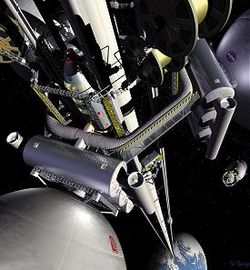Think of this as Volume 15, Number 11 of A-Clue.com, the online newsletter I've written since 1997. Enjoy.

We had beaten Mexico in a war, creating an hegemony extending deep into Central America under the guise of the Monroe Doctrine, and the hero of that war would be elected President. (For those scoring at home it was Zachary Taylor.) We had directly acquired the entire American West, and a man named James Marshall found this piece of gold in California, launching a boom that would get us out of the red for the first time in over a decade.
Good times.
In Europe, 1848 represented something completely different. It was the false dawn, the year of the barricades, the uprising against which great art like La Boheme would be created. Monarchies toppled but the system did not fall. In the end the center held, although nationalism had been unleashed, so that in the next generation much of the European map we know today would be created, Germany and Italy being born.
Why the history lesson? Because what many will call 2011, the “year of rebellion,” is starting to feel a little like 1848, and not in a gold rush way.
And because the result, as that of 1848, is not up to me.

But first some headlines.
The rebellions in Tunisia and Egypt succeeded, but many wonder if they did anything but replace the velvet glove of a dictator with the iron fist of the Army. The bloodier rebellion of Libya seems fated to create a radical state of some sort, but what sort is unknown. Sheikhs across the Arabian peninsula are struggling to pay-off suddenly restive masses, and Iran has responded with a brutal crackdown that is not being televised – and is barely heard on Twitter due to the din from Libya.

Driven by scarcity, and the capture of politics by a dying industry, along with the pig ignorance of my own generation (which thinks it's in power), we now face an historical crisis with no real Clue as to what it's about.
What it's about, as I've said many times here lately, is power. Electric power, automotive power, the basic means by which we run our modern societies. The people who own the Republican Party (and have great influence among many Democrats as well) own the means of power production, fossil fuels. As we burn them, they become more scarce, more valuable, and those who control our politics want that to continue, even accelerate, because they own the coal, the oil, and the natural gas reserves in question.

That is the issue. There is no other issue. Everything else you think matters – unions, liberty, the Internet, global warming, the budget – it's all secondary to this economic issue, and can be solved once we solve this technological issue. Because once we're harvesting energy rather than burning stuff, we leave this current economy based on scarcity and enter a new world based on abundance.

The key term in the above paragraph is “the next generation.”
I'm 56. This is not my political crisis. Mine was the Vietnam Era, its result being the creation of technologies that make it possible for you to read these words anywhere you are, on whatever you're using, with distribution costs near zero. My generation gave yours the medium and the means of solving these other problems.
The answers lie in science, in engineering, and in the mechanics of business. All people like the Koch Brothers can do is delay those solutions, extracting some more years of monopoly rents on caveman energy through the power of political control. The solutions to the problems of our time, in other words, are in your hands. How quickly they're solved depends on you.

The kids are quite all right. But many don't know this, and others don't understand the underlying issue before them, let alone how to tackle it, because my generation hasn't told them.
If you read these words, you now know. You have a frame for understanding what is before you. I have given you a thesis you can test against reality, from which you may draw conclusions, and here is a medium you can use to act upon those conclusions.
But I can't fight this war for you. No one my age can. We have raised you as well as we could, we have given you this world and this crisis, and it is up to you to solve it. Which 1848 this turns out to be is entirely up to you and your peers.
Good luck.












Actually there is a solution to the entitlement conundrum and it has everything to do with the “economics of abundance.”
It is finally figuring out that money is never constrained.
Actually there is a solution to the entitlement conundrum and it has everything to do with the “economics of abundance.”
It is finally figuring out that money is never constrained.